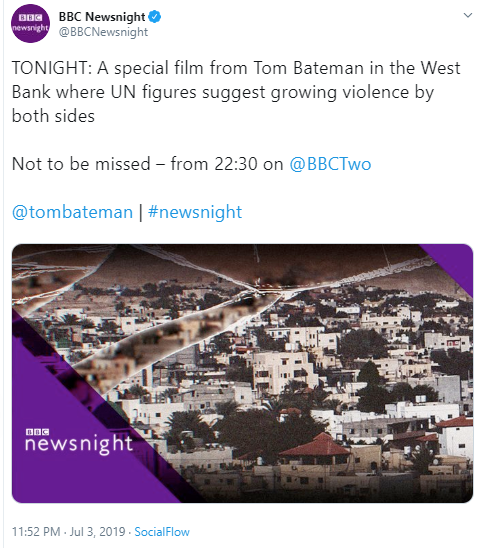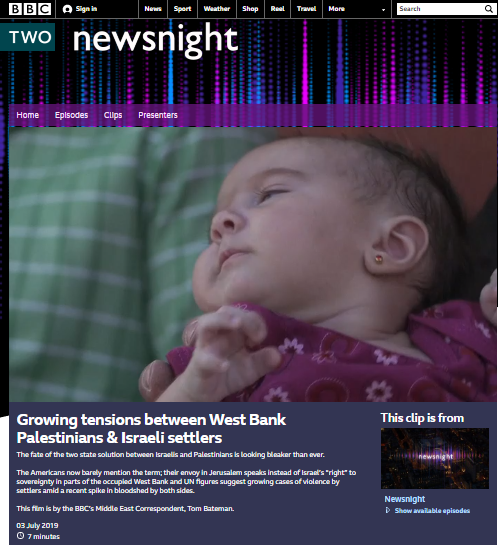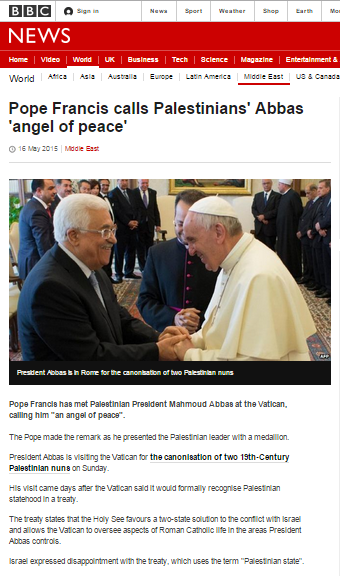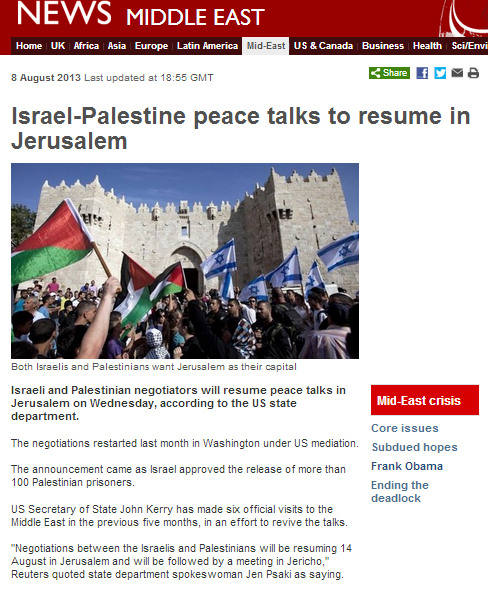The July 3rd edition of the BBC Two programme ‘Newsnight’ included a report by the Jerusalem bureau’s Tom Bateman which was described by the BBC as “not to be missed”.
As well as being shown on the programme itself, a clip from the report was posted on the Newsnight webpage under the title “Growing tensions between West Bank Palestinians & Israeli settlers”.
“The fate of the two state solution between Israelis and Palestinians is looking bleaker than ever.
The Americans now barely mention the term; their envoy in Jerusalem speaks instead of Israel’s “right” to sovereignty in parts of the occupied West Bank and UN figures suggest growing cases of violence by settlers amid a recent spike in bloodshed by both sides.”
Neither in that synopsis nor the report itself were audiences told which UN agency produced those figures but it is more than likely the highly partisan UNOCHA which produces regular reports based on information provided by political NGOs, some of which are involved in ‘lawfare’ campaigns against Israel.
Bateman opened his report with an incident which took place in Yasuf in early June, telling viewers that:
“The Israeli police say they are searching for the suspects but so far they’ve found no-one: a common outcome in these kinds of cases.”
After giving air-time to unevidenced claims from another interviewee from the same village, Bateman told viewers that:
“These villagers grew up under military occupation. Now their children see the Israeli watch towers too. Reported hate crimes against Palestinians doubled to nearly 300 last year says the UN. Villagers must ultimately turn to the Israeli army for protection, with all the complexity that entails. A military drawn from one people among two hostile populations.”
Having spoken to the deputy mayor of Yasuf, Bateman told BBC audiences:
“I think the main thing is that this is not just about isolated incidents. When you come here and you speak to people, you’re really struck by how this is a way of life: a low-level conflict. People feel intimidated, under threat. And at the end of that really you have two sides, both seeking control of the same land.”
By now at the half-way point in his report, Bateman told viewers that “the village [Yasuf] looks out onto several settlements – and they’re growing” and then went on to interview an Israeli couple from Tapuach West, promoting the BBC’s partisan international law mantra en route.
“Rivka took me to see the settlement outpost her family built. Like most Israelis she rejects the view of international law that sees the settlements as illegal. She is among the most ideological supporters. But an anti-occupation group recently petitioned the Israeli courts and her home was demolished.”
While Bateman did not identify that “anti-occupation group”, he was apparently referring to the political NGO ‘Yesh Din’. He told viewers:
“They talk of a constant threat. Late last year there was a surge of violence in the West Bank. In a matter of months five Israelis were killed by Palestinians and alleged attacks by settlers saw at least two Palestinians die.”
Between October and December 2018 inclusive five Israelis were murdered in terror attacks perpetrated by Palestinians. We have been able to find record of one Palestinian fatality during the same period of time. Bateman did not inform viewers that a suspect has been charged in connection with that case.
As regular readers will be aware, the BBC has a long record of under-reporting Palestinian terrorism, particularly when attacks do not result in fatalities. In 2018 the BBC News website reported at most 30.2% of the terror attacks that actually took place and 93.3% of the resulting fatalities. Throughout the whole of 2017 the BBC News website reported a total of fourteen incidents – i.e. 0.92% of the terror attacks which actually took place – and 89% of the total fatalities.
Quoting anonymous “campaign groups” but providing no evidence to support the claim, Bateman closed his report by telling viewers that:
“Settler violence reinforces the goals of the state, say campaign groups, to take as much land as possible.”
He did not bother to clarify that such attacks have long been publicly and repeatedly condemned by Israel’s prime minister, leaders of the communities in Judea & Samaria, security officials and the Israeli public.
Bateman concluded with two further claims:
“Israel routinely says it investigates these cases but conviction rates are extremely low.”
“…the settlement movement is arguably enjoying more support than ever…”
The most notable aspect of this “not to be missed” report from Tom Bateman is, however, the part of the story that he chose to leave out. Throughout the entire item, no effort was made to inform BBC audiences of the differences between the policies of the Israeli authorities – investigations, arrests, and legal action taken against those suspected of carrying out attacks – and the approach of the Palestinian Authority to those of its citizens carrying out violent attacks against Israelis: glorification of the acts and their perpetrators and financial rewards.
That is obviously a very serious omission, particularly given that the BBC’s record of reporting on PA incitement, glorification of terrorism and payment of salaries to terrorists means that audiences would be unlikely to be able to fill in the gaps for themselves.
Related Articles:
BBC Complaints clarifies discrepancies in terminology when reporting terrorism
Reviewing BBC News website follow-up reporting on terrorism in Israel




